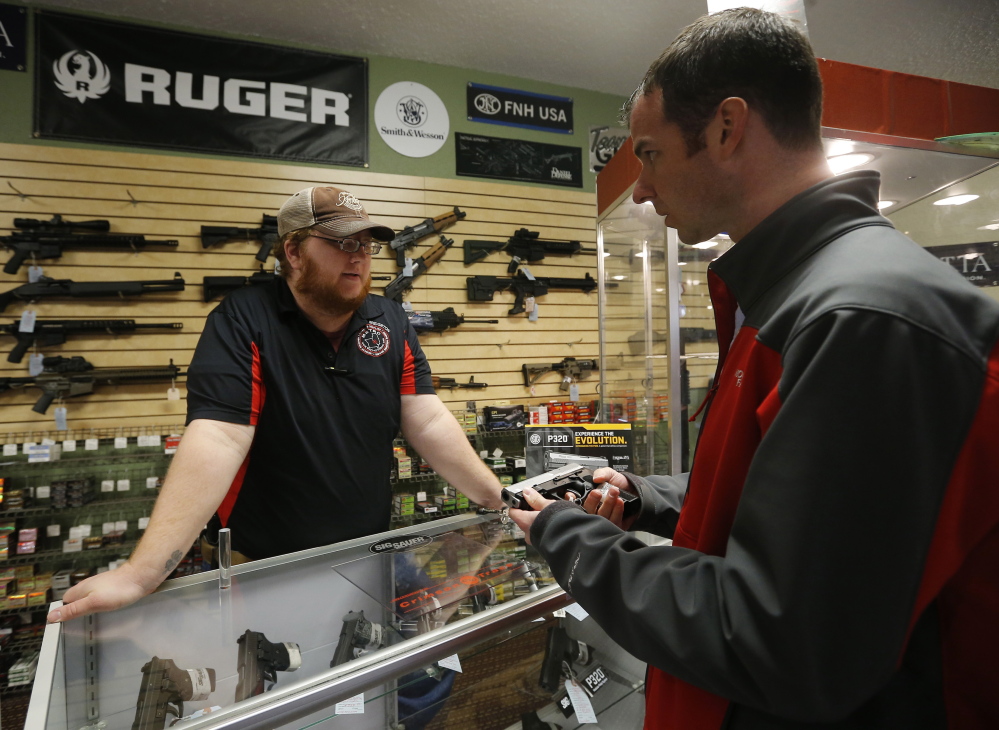BRIDGEPORT, W.Va. — Black Friday isn’t just when shoppers rush to stores for holiday sales. It’s also one of the busiest days of the year for gun purchases.
In the U.S., there are nine guns for every 10 people. Someone is killed with a firearm every 16 minutes. And every minute, gun shops make about 40 new requests for criminal background checks on people wanting weapons.
On Black Friday, the rush accelerates to nearly two checks a second, testing the limits of the National Instant Criminal Background Check System.
“We have a perfect storm coming,” says Kimberly Del Greco, a manager in the FBI division that helps run the system, known as NICS.
Much of the responsibility for preventing criminals and the mentally ill from buying guns is shouldered by about 500 men and women who run the system from inside the FBI’s criminal justice center near Bridgeport, West Virginia.
Granted a rare glimpse into the inner workings of the NICS, The Associated Press was able to see first-hand why 512 gun sales a day effectively beat the system last year.
By federal law, NICS researchers must race against the clock: They have until the end of the third business day following an attempted firearm purchase to determine whether a buyer is eligible. After that, buyers can legally get their guns, regardless of whether the check was completed.
TIME NOT ON FBI’S SIDE
This clock ran out more than 186,000 times last year.
The problem is the data.
States voluntarily submit records, which are often missing information about mental health rulings or criminal convictions, and aren’t always updated to reflect restraining orders or other urgent reasons to deny a sale. It’s a particular problem on Black Friday, when so many background checks are done at once.
There are more than 48,000 gun retailers in the U.S., from Wal-Mart stores to local pawn shops. Store clerks can use the FBI’s online E-Check System, which federal officials say is more efficient. But nearly half the checks are phoned in. Three call centers – in Kentucky, Texas and Wheeling, West Virginia – take these calls from 8 a.m. to 1 a.m. every day but Christmas.
NICS did 58,000 checks on a typical day last year. That surged to 145,000 on Black Friday. They’re bringing in 100 more workers than usual for the post-Thanksgiving rush.
The call centers have no access to privileged information about buyers’ backgrounds, and make no decisions. They just type in their name, address, birthdate, Social Security and other information into the system. On Black Fridays, the work can be grueling: One woman took a call that lasted four hours when a dealer phoned in the maximum 99 checks.
“Rules had to be stretched,” recalled Sam Demarco, her supervisor. “We can’t transfer calls. Someone had to sit in her seat for her while she went to the bathroom.”
RED FLAG NOT ALWAYS APPARENT
In the years since these background checks were required, about 71 percent have found no red flags and produced instant approvals.
But 10 factors can disqualify gun purchasers: a felony conviction, an arrest warrant, a documented drug problem or mental illness, undocumented immigration status, a dishonorable military discharge, a renunciation of U.S. citizenship, a restraining order, a history of domestic violence, or an indictment for any crime punishable by longer than one year of prison time.
Any sign that one of these factors could be in a buyer’s background produces a red flag. FBI researchers then investigate, scouring state records in the federal database and calling state and local authorities for more information.
“It takes a lot of effort … for an examiner to go out and look at court reports, look at judges’ documents, try to find a final disposition so we can get back to a gun dealer on whether they can sell that gun or not,” Del Greco says. “And we don’t always get back to them.”
The researchers must use their judgment, striking a balance between the rights of gun owners and the need to keep would-be killers from getting firearms.FBI contractors and employees oversaw more than 9 million checks in the first full year after the system was established as part of Brady Handgun Violence Prevention Act in 1998. By last year, they oversaw more than 21 million. In all, only 1.25 percent of attempted purchases are denied. Denials can be appealed.
People can get guns without background checks in many states by buying weapons at gun shows or from individuals, a loophole the National Rifle Association does not want closed. But even the NRA agrees that the NICS system needs better data.
Del Greco doesn’t see the states’ data improving soon, which only adds to the immense challenge of getting through huge numbers of requisite checks on Black Friday.
“It’s really critical that we have accurate information,” Del Greco says. “Sometimes we just don’t.”
Send questions/comments to the editors.



Success. Please wait for the page to reload. If the page does not reload within 5 seconds, please refresh the page.
Enter your email and password to access comments.
Hi, to comment on stories you must . This profile is in addition to your subscription and website login.
Already have a commenting profile? .
Invalid username/password.
Please check your email to confirm and complete your registration.
Only subscribers are eligible to post comments. Please subscribe or login first for digital access. Here’s why.
Use the form below to reset your password. When you've submitted your account email, we will send an email with a reset code.